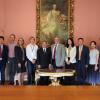
IIASA researchers contributed to a new report that argues for an integrated economy-wide decarbonization, in which China not only meets its carbon neutrality target, but also achieves a broader vision for growth and development.
The report titled, China’s New Growth Pathway: from the 14th Five Year Plan to Carbon Neutrality, is a major deliverable of the country’s Long-Term Strategy Task Force. It provides an overall picture of the pathways that support China’s carbon neutrality goal and its new vision for growth and development, and identifies both long-term sectoral strategies and near-term actions to prepare China to achieve carbon neutrality before 2060.
The report follows an Expert Dialogue on Development, Energy, and the Environment hosted at IIASA in January this year with participants from China, the US and Europe, during which the research needs for informing China’s mid- and long-term development, energy, and environmental strategies were explored.
The report, which contains contributions from 21 authors from eight different organizations including IIASA, argues for an integrated economy-wide decarbonization, in which China not only meets its carbon neutrality target, but also achieves a broader vision for growth and development. Strategies such as transitioning away from fossil fuels, increasing sustainable transport, and modernizing the country’s industry sector can be combined to deliver on multiple goals—from clean job growth and prosperity to cleaner skies and improved health, to energy security. Meanwhile, the global and domestic trends China is experiencing, such as rapid urbanization and a growing middle class, demand immediate and coordinated actions.
“Carbon neutrality is an economy-wide challenge and substantial actions need to be undertaken across all sectors of the economy,” says Leon Clarke, Research Director of the Center for Global Sustainability at the University of Maryland. “Taking actions like phasing out coal power in lieu of renewable energy or transitioning to low-carbon transportation will support other development goals such as improved air quality and international science and technology leadership.”
China’s 2060 Pledge is a significant contribution to the world’s effort in limiting warming to 1.5°C. However, actions must be taken swiftly.
“The 2060 goal will support global efforts to limit warming to 1.5°C,” notes Fu Sha, Program Director of Low Carbon Economic Growth Energy Foundation China. “But to do this, China needs to take actions now to meet the global call for accelerated climate action. There is no time for delay.”
IIASA researchers Fei Guo, Nicklas Forsell, and Volker Krey contributed to the report under an Energy Foundation China project.
“Previous research on developing national emissions mitigation pathways conducted by IIASA researchers in collaboration with Chinese and international partners as part of the CD-LINKS and ENGAGE projects has proven to be very valuable for assessing China’s carbon neutrality goal and to put it into the context of the 1.5°C and 2°C goals of the Paris Agreement,” Krey concludes.
An international launch event will take place on Wednesday, 16 December from 17:00–18:00 CET. The report was supported by IIASA, the China Academy of Transportation Sciences, Harbin Institute of Technology, the Innovative Green Development Program, Renmin University, and Tsinghua University.
Download the summary for policy makers.
Download the full report.
Adapted from a press release prepared by Energy Foundation China and the University of Maryland.
News

10 June 2024
Analyzing the benefits of transboundary cooperation in the Lancang-Mekong River Basin

29 November 2023
Embracing ecological perspectives, tools, and models to navigate the digital economy

04 July 2023

